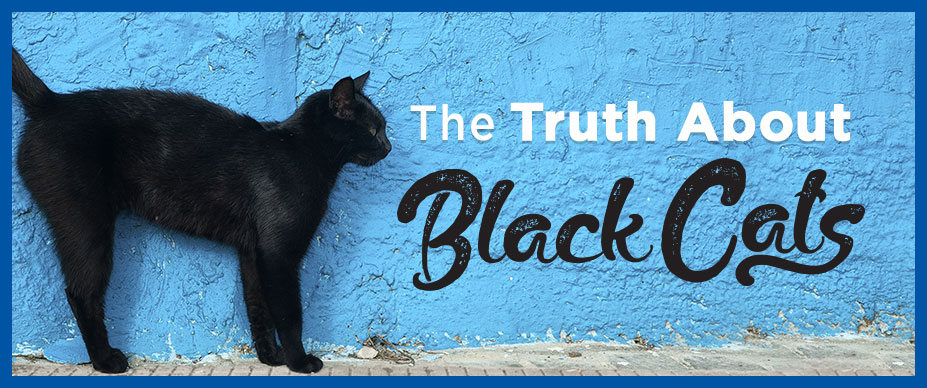Black Cat Meaning: Myths and Facts Debunked
Unfortunately, black cats are often considered a superstition and are often less likely to be adopted from shelters. In reality, many cultures have different beliefs about the actual black cat meaning. In fact, seeing a black cat has been associated with luck—both good and bad—for thousands of years. So, we’ve set out to bust common stereotypes about these loveable kitties!
Where Do Black Cats Come From?
Black cat superstition in Western culture dates back to Ancient Greece. According to Greek mythology, Zeus’s wife Hera once transformed her servant, Galinthias, into a black cat as punishment for impeding the birth of Hercules. Galinthias went on to become an assistant to Hecate, the goddess of witchcraft, and black cats have had unique meanings in various cultures ever since.
Myth: Seeing a Black Cat Brings Bad Luck
You’ve probably heard that it’s unlucky to see a black cat crossing your path. Although the origin of this common black cat myth is uncertain, it may have to do with the cat’s slick demeanor. A black cat’s sly movements might suggest to some superstitious spectators that they’re up to no good.
Why It's Busted
Show of hands: Who has had a black cat cross their path? How many of you have been doomed to a life of bad luck? Black cats shouldn’t get a bad rap just because they look sneaky. So, what does a black cat symbolize other than doom and gloom? They’re considered good luck in many cultures. In Scotland, it’s lucky for a strange black cat to arrive at your doorstep. In Japan, the black cat meaning is associated with helping single women find suitors. There are a lot of silly black cat superstitions out there, but most of the world acknowledges black cats as cute—not creepy.
Myth: Black Cats Are Witches
Many early American settlers believed in witches who could take the form of black cats. This would allow them to sneak around unnoticed as they performed magic spells. It was also believed that a witch could shapeshift into a black cat up to nine times, which may have something to do with the belief that cats have nine lives. In today’s pop culture, black cats are often featured either as witches or alongside witches.
Why It's Busted
If you’ve ever had a black cat purr up against you, you’d know he’s way too cuddly to be a witch. We’re going to go out on a limb and say the evilest thing yours has ever done is scratch up the sofa.
Myth: You Shouldn't Adopt a Black Cat
Black cats have some of the lowest adoption rates and highest euthanasia rates in shelters across the United States. It’s also harder to attract adopters—rescues and shelters often feature photos of their adoptable cats online, and black cats are more difficult to photograph than lighter-coated cats. It’s been reported that potential adopters perceive black pets as less friendly than lighter-coated pets solely based on a photograph. Some shelters even stop adopting out black cats in October altogether in fear that they’ll be used as Halloween props.
Show of hands: Who has had a black cat cross their path? How many of you have been doomed to a life of bad luck? Black cats shouldn’t get a bad rap just because they look sneaky. In fact, they’re considered good luck in many cultures. In Scotland, it’s lucky for a strange black cat to arrive at your doorstep. In Japan, black cats are thought to help single women find suitors. There’s a lot of silly superstitions out there, but most of the world acknowledges black cats as cute—not creepy.
Why It's Busted
Those statistics don’t mean that you should stay away from adopting a black cat. You shouldn’t choose an adoptable pet simply based on a photo; meeting the pet in person is the best way to gauge if he or she is the right fit for you. Your purrfect match just might be a sweet black cat waiting for you at your local shelter. Plus, you can even give them a special cat name specific to their coat—like Salem or Shadow! (Not to mention, black cats are great for avoiding light hairs showing up on all your clothes!)
Thinking about welcoming home a new feline friend? Check out these tips for preparing for a newly adopted kitty…regardless of their coat color!
There’s no need to be a fraidy cat. Let’s try to put the old fables behind us and show black cats the love they deserve.
Resources
ASPCA
PetMD.com
Smithsonian.com








